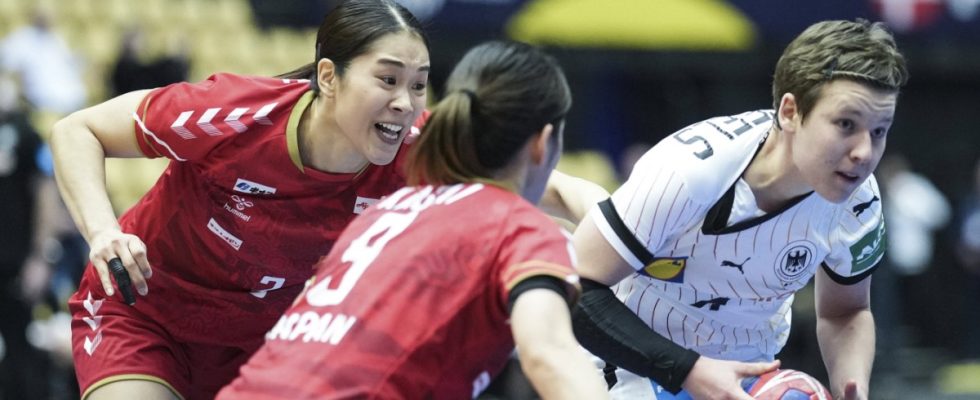In France, time has sometimes been running backwards for Alina Grijseels. In the hall of her new club Metz Handball, a digital clock counts down the days until the Olympic Games in Paris. There are currently 237 left.
It’s not just the Lorraine club’s many French national players who are electrified by the countdown. Also Grijseels. From Metz to Paris it is only 280 kilometers. But her path to the Olympics feels much further. At the World Cup in Scandinavia, where the 27-year-old is currently serving as German captain, her team first has to get a ticket to an Olympic qualifying tournament in April. And that won’t be so easy. Germany won the opening game in Herning, Denmark, with difficulty 31:30 against Japan. Xenia Smits scored the winning goal in the penultimate second. Grijseels was the best German player with seven goals and four assists.
The native of Wesel in the Lower Rhine will play a decisive role in whether German handball players are allowed to play at the Olympics again for the first time since 2008. She plays in a strategically relevant position in the central backcourt and distributes the balls there. She does this so well that she became German champion with Borussia Dortmund in 2021 and was recently voted Germany’s handball player of the year twice in a row.
New country, new language, new teammates – a challenge for Grijseels
After nine years at BVB, she moved to the top club Metz in the summer, where around a third of the national players of the current Olympic champion France play and where Emmanuel Mayonnade, 40, one of the world’s best coaches in women’s handball, has been working successfully for a long time. In 2019, in what was then a second job as a bond coach, he also made the Dutch women world champions. “Metz is a top club with many top international players,” says Grijseels, “and I’ve never had a coach as meticulous as Emmanuel Mayonnade.”
The first few weeks were correspondingly challenging. Grijseels, previously in Dortmund and increasingly used as a playmaker in the national team since 2018, has to take a back seat in Metz. “I’m not where I want to be yet,” she says, “but that will come.” New country, new language, new teammates, new coach, new style of play – overcoming so many challenges should only make them stronger in the end. “This is good for my personal and sporting development,” she says. And therefore also good for the national team.
The national coach Markus Gaugisch easily raves about Grijseels. “Alina is very clear even in stressful moments and helps the team with her calm and confident manner.” Gaugisch did a count: “There are a total of ten Metz players at this World Cup.” Making it through such a high-profile club is a huge challenge for Grijseels. “Metz is a huge personal step for Alina,” says Gaugisch, “she has to fight there every day, but that will move her forward.”
In order to take part in a qualifying tournament, the German team must reach the World Cup quarter-finals
At such top clubs and in France in general, women’s handball has a different status than in Germany: better infrastructure, higher pay, greater public interest. In Dortmund there are around 1,000 spectators for a league game, in Metz there are up to 4,500 for the Champions League. At the squad presentation in the summer, the handball players drove over the Moselle in motor boats and happily waved club flags for the photographers and cameramen. Since then, the team has played its way to the top of the French league and second place in its Champions League group. “Championship and cup victory are clear goals,” says Grijseels, “in the Champions League it’s the final four.”
Her personal goal is the Olympics, and the idea of meeting her colleagues from the French league there as the German captain makes it even more attractive. Another German who plays in the national team is goalkeeper Katharina Filter for Brest in France. In order to take part in a qualifying tournament in April, the German team must reach the quarter-finals of the World Cup.
Grijseels read favorably that her colleague Antje Döll claimed before the World Cup that the German team was stronger than ever. She likes so much optimism. After three recent seventh places in major tournaments, she herself believes: “We still have a step to go before we reach the top of the world, and the squads of the top nations are perhaps a little better positioned in terms of breadth, but I am convinced that the experiences of the past have given us years have brought us forward.” It’s now about consistency, about allowing yourself as few weak phases as possible: “We need coolness and conviction; we have to get into a flow.”
In Metz she noticed that people in France look at German handball players with awe. “They think we’re strong and think we’re a very good team,” reports Grijseels. That makes you proud – and makes you want to go to the Olympics even more. At the World Cup, Alina Grijseels wants to ensure that the countdown in Metz continues for her.

